Biodynamic – The Moon, The Stars & Cow Horns
Wine is entirely dependent on Nature. Without her, there is no wine.
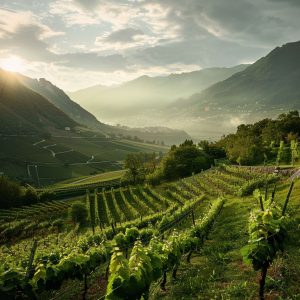
? What does Biodynamic mean?
? Biodynamic – The Moon & The Stars
? What Makes Biodynamic Wine
? Do Biodynamic Wines Taste Differently?
? Biodynamic Composting
? How to find Biodynamic Wines in CH
What does Biodynamic mean?
Biodynamics is a holistic view of agriculture. (winefolly.com)
Wine producers who practice biodynamics view their operation as a living and self-sustaining system as a whole. The soil is not just seen as a medium for plant growth but as an independent organism. Special natural preparations are used to improve soil quality, applied at appropriate times in harmony with the rhythms of nature (e.g., according to lunar phases). (winefolly.com)

Mathilde Roux from Cave De L’Orlaya, a Swiss Wine Maker, says: “We respect the lunar cycles and strive to have a global vision of the vineyard within its ecosystem.” (Cave De L’Orlaya)
In Short: Biodynamic viticulture – A desire to enhance the energy exchange between vine, human, earth, and stars to harness positive effects for the plant and consequently for the finished wine. (winefolly.com)
Biodynamic & Rudolph Steiner

The concept of Biodynamics started in the 1920’s with an Austrian philosopher named Rudolph Steiner, in Koberwitz, in present-day Poland. He delivered a series of lectures on an estate there, which laid the foundation for biodynamic agriculture, with products traded under the Demeter brand. (demeter.ch)
Biodynamic – The Moon & The Stars
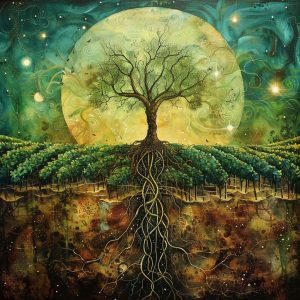
The fundamental concept of biodynamics revolves around the belief that all things in our universe are interconnected and emit a kind of cosmic resonance or energy. Celestial bodies such as the moon, planets, and stars play a significant role in this. When considering the role of the moon in causing tides on Earth, this assumption becomes easily understandable. (winefolly.com)
Tasks such as pruning, fertilizing, weeding, and even harvesting are guided by a biodynamic calendar.
The main difference lies in the fact that biodynamic viticulture aims to consider the entire ecosystem. Natural resources are meant to be conserved, and the life processes are deliberately promoted through the interaction of earthly and cosmic forces.
The principles of biodynamics aren’t new; ancient Greeks and Egyptians noted and used the moon’s influence on farming. (winefolly.com)
What Makes Wine Biodynamic?
Biodynamic wines follow a special calendar that guides vineyard tasks – The Biodynamic Calendar. The calendar, created by Maria Thun, divides days into:
Root, Fruit, Flower, and Leaf Days, aligned with Earth, Fire, Air, and Water (see the picture!).
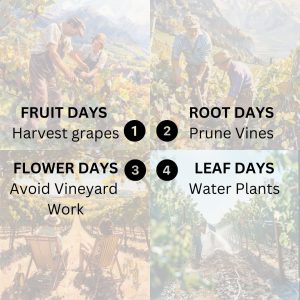
The 4 stages are explained in more detail here: Fruit Day vs. Root Days (winefolly.com)
Besides the biodynamic calendar, no chemicals are allowed in biodynamic wine. Instead, wine growers make special compost preparations with natural ingredients to bolster their vineyards. This is where things start to get controversial. (winefolly.com)
Biodynamic Composting
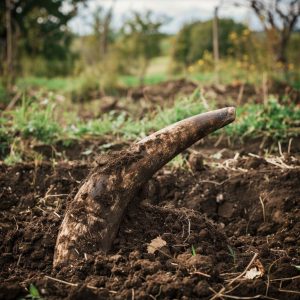
Biodynamic viticulture requires special compost preparations that are stuffed into cow horns and buried in the soil. Later, the cow horns are dug up and reused and the ’stuffing’ is distributed throughout the vineyard.
Many believe the practice of biodynamic composting is pseudoscience. Regardless, the historical precedence perhaps explains why cow horns are used: the animal horn is a symbol of abundance. For example, the Vikings believed that water drunk from a horn contained life enhancing properties. (wewine.vn)
FACT: Biodynamic soils have been tested against non-organic soils and they showed greater disease suppression, a decrease in compaction and added organic material. (winefolly.com)
How to find Biodynamic Wines in Switzerland?
Biodynamic wines must be certified. There are 2 governing bodies overseeing the rules and regulation:
- Demeter International In 1924, the cultivation association Demeter was founded, which remains the most important and largest biodynamic association to this day. (Book: Finde Deinen Wein – Madelyne Meyer) E.g. Anne-Claire Schott, who I wrote about in Blog Post 5, produces demeter-certified wines and also, the famous Marie-Thérèse Chappaz.
- Biodyvin certifies only 100 European wineries.
TIP: Currently, around 60 Swiss wineries are Demeter-certified, while there are over 700 Demeter wineries worldwide. (demeter.ch)
There are many more Demeter Certified Wine Makers in Switzerland, e.g.:
Do Biodynamic Wines taste differently?
In a study conducted it was shown that there is an absence of a significant differencee between biodynamic and conventional wines in the blind tasting (Troiano, Marangon, Nassivera, Piasentier, & Favotto, 2020).
Did you ever try a Biodynamic Wine?
———–
Do you have any more questions regarding Biodynamic Wine?
You want to learn more about Swiss Wine? Then check out the following articles:
- Exploring Swiss Wine Regions: Unveilling The Terroir
- A Beginner’s Guide to (Swiss) Wine Tasting.
- Swiss Wine Varieties: Indigenous Grapes
- Which Wine Goes Well With My Food
- 3 Swiss Female Winemakers You Should Remember
Eager for more insights into Swiss Wine? Follow me on Instagram for a behind-the-scenes look at the vibrant world of Swiss viticulture! ![]()
Sources:
- All pictures have been created via Midjourney except of the one indicated having been created on Canva. Only the pictures needing further explanation have a caption.
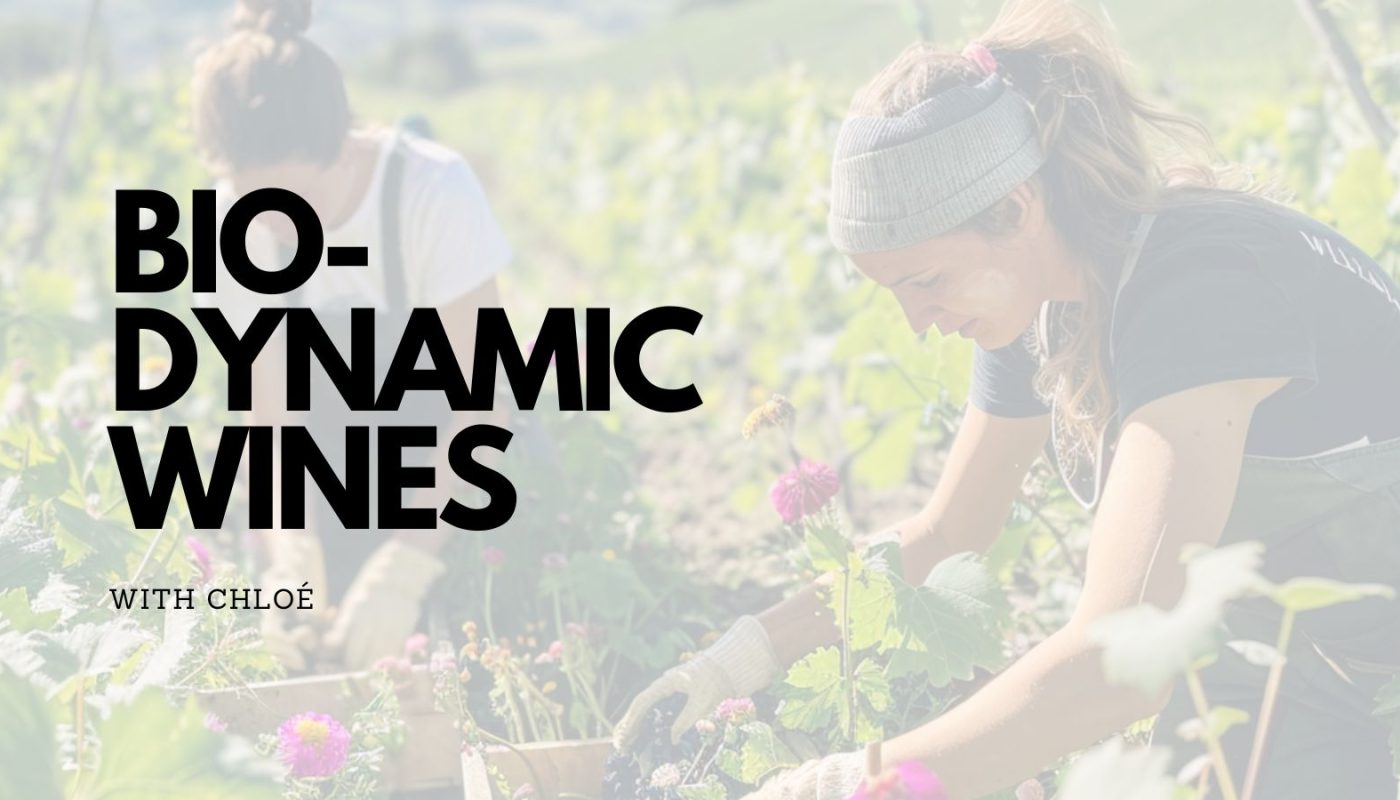

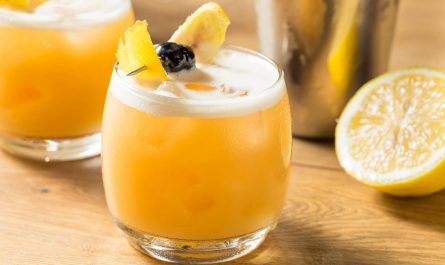


Very nice blog; I would never have guessed that cow horns are used in wine production.
Hi Diego
Right? The world of wine is full of surprises 🙂
So when drinking a biodynamic wine next time (or for the first time?) it will be a totally new experience!
Cheers, Chloé
Thanks for sharing such insights that are unknown to most uf us wine drinkers.
Hi Alessia
I hope you could take away some things and maybe use your knowledge at the next wine event 🙂
Or when next being in store decinding what wine you want to buy.
Cheers,
Chloé
Sehr aufwändige Arbeit in den Rebbergen!
Hi Thomas
Auf jeden Fall… aber die Arbeit lohnt sich 🙂
Hast du schon mal einen Biodynamischen Wein getrunken?
Cheers, Chloé
Super spannende Infos! 60 Winzerinnen/Winzer in der Schweiz Demeter zertifiziert. Ich habe erst wenige Demeter-Weine getrunken. Dies werde ich ändern! Thk you???
Hallo Regula
Vielen Dank für deinen Kommentar! ? Es freut mich, dass du die Infos spannend findest. Die Demeter-Zertifizierung ist wirklich ein interessanter Aspekt im Weinbau und es gibt viele tolle Weine von diesen Winzerinnen und Winzern in der Schweiz. Ich bin sicher, dass du viele neue Lieblingsweine entdecken wirst. Prost und viel Spaß beim Verkosten! ?
Cheers, Chloé
Amazing Blog! After reading this, I would really like to try biodynamic wine to see if I notice any differences☺️
Hi Nicole
Thank you so much for your kind words! ? I’m thrilled to hear that you enjoyed the blog. Biodynamic wine is indeed fascinating, with its unique approach to viticulture and winemaking. The emphasis on natural processes and holistic practices often results in wines with distinctive flavors and characteristics. I hope you have a wonderful experience exploring biodynamic wines and discovering the differences for yourself.
Cheers to new wine adventures! ?✨
Hei Chloé! Thank you for the interesting information? I never knew what biodynamic meant. Thank you for explaining! I will definitely try a biodynamic wine?
Hi Sandra!
I’m glad you found the information helpful! ? Biodynamic wine is truly unique, and I’m excited for you to give it a try.
If ever you have any questions or need any recommendations, let me know.
Cheers to your upcoming wine adventure! ?✨
Chloé
Hi
That sounds so interesting, I drink lots of Biodynamic Wines but never fully understood what it is about, now I finally get the background.Very interesting.
Peter
Hi Peter
Thanks so much for your comment! Super happy to have given you additional information that you find useful and now hopefully, in the future you can drink biodynamic wines even more consciously 🙂
Cheers,
Chloé
Very cool blog post – very nice topic choice! To answer your question, yes, I did try biodynamic wines already, loved it, tastes like any other wine tbh. I am very much looking forward to more content from you. Love Swiss Wines.
Greetings from Zurich
Hi Lara
Thank you so much for your kind words! ? I’m thrilled you enjoyed the blog post and found the topic interesting. ? It’s awesome to hear that you’ve tried biodynamic wines and loved them! ? Swiss wines are truly special, aren’t they? ?? I’ll definitely be sharing more content about them in the future. Greetings back to Zurich! ? Chloé